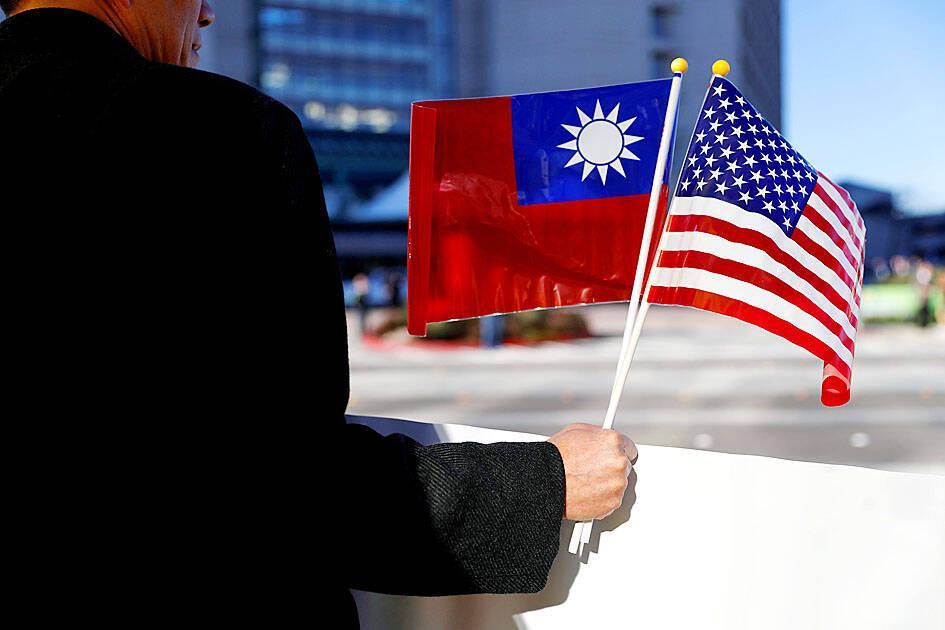US Representative Raja Krishnamoorthi yesterday introduced a bipartisan bill that would make the “six assurances” — a long-standing US foreign policy governing relations with Taiwan — official US law.
The “six assurances” were issued in 1982 by then-US president Ronald Reagan and have been reaffirmed by US presidents and Taiwan-related legislation since, a news release by the US House of Representatives Select Committee on Strategic Competition between the United States and the Chinese Communist Party (CCP) said.
Then-head of the American Institute in Taiwan, James Lilley, presented then-president Chiang Ching-kuo (蔣經國) with Reagan’s assurances in a private letter rather than an official government document.

Photo: Reuters
Unlike the Taiwan Relations Act, the “six assurances” have never become an official law dictating US-Taiwan relations and the exact text Lilley delivered has never been found.
The “six assurances” are the following: The US agreed to not set a date for ending arm sales to Taiwan, it would not consult with China on arms sales to Taiwan, it would not mediate between either side, would not revise the Taiwan Relations Act, would not change its official position on Taiwan’s sovereignty and would not pressure Taiwan to negotiate these matters with China.
“Taiwan is a vibrant democracy and a critical partner to the United States, and it deserves clarity and certainty when it comes to our commitments,” Krishnamoorthi said in the news release.
“By codifying the six assurances, this bill sends a clear, bipartisan message: We will stand firm against coercion, support peace and stability in the Taiwan Strait, and ensure that US policy remains consistent, principled and rooted in law,” Krishnamoorthi added.
The bill is cosponsored by US representatives Gregory Meeks, Zach Nunn, Greg Stanton, Young Kim and Nicole Malliotakis.
To become law, the bill would have to pass the House of Representatives and Senate before being signed by the president.
In August last year, the US Democratic Party for the first time included the “six assurances” in its party platform, committing to maintaining peace and stability in the Taiwan Strait.
This bill comes the same day as the committee held a hearing titled “Deterrence Amid Rising Tensions: Preventing CCP Aggression on Taiwan,” which saw two former military officials and a former deputy secretary of state testify regarding rising regional tensions and concerns about US role in a potential conflict.
“A CCP attack on Taiwan would be unacceptable for our prosperity, our security and our values,” Krishnamoorthi said at the hearing.

A drunk woman was sexually assaulted inside a crowded concourse of Taipei Railway Station on Thursday last week before a foreign tourist notified police, leading to calls for better education on bystander intervention and review of security infrastructure. The man, surnamed Chiu (邱), was taken into custody on charges of sexual assault, taking advantage of the woman’s condition and public indecency. Police discovered that Chiu was a fugitive with prior convictions for vehicle theft. He has been taken into custody and is to complete his unserved six-month sentence, police said. On Thursday last week, Chiu was seen wearing a white

EVA Airways, one of the leading international carriers in Taiwan, yesterday said that it was investigating reports that a cabin crew manager had ignored the condition of a sick flight attendant, who died on Saturday. The airline made the statement in response to a post circulating on social media that said that the flight attendant on an outbound flight was feeling sick and notified the cabin crew manager. Although the flight attendant grew increasingly ill on the return flight, the manager did not contact Medlink — a system that connects the aircraft to doctors on the ground for treatment advice during medical

The Taoyuan Flight Attendants’ Union yesterday vowed to protest at the EVA Air Marathon on Sunday next week should EVA Airway Corp’s management continue to ignore the union’s petition to change rules on employees’ leave of absence system, after a flight attendant reportedly died after working on a long-haul flight while ill. The case has generated public discussion over whether taking personal or sick leave should affect a worker’s performance review. Several union members yesterday protested at the Legislative Yuan, holding white flowers and placards, while shouting: “Life is priceless; requesting leave is not a crime.” “The union is scheduled to meet with

‘UNITED FRONT’ RHETORIC: China’s TAO also plans to hold weekly, instead of biweekly, news conferences because it wants to control the cross-strait discourse, an expert said China’s plan to expand its single-entry visa-on-arrival service to Taiwanese would be of limited interest to Taiwanese and is a feeble attempt by Chinese administrators to demonstrate that they are doing something, the Mainland Affairs Council said yesterday. China’s Taiwan Affairs Office (TAO) spokesman Chen Binhua (陳斌華) said the program aims to facilitate travel to China for Taiwanese compatriots, regardless of whether they are arriving via direct flights or are entering mainland China through Hong Kong, Macau or other countries, and they would be able to apply for a single-entry visa-on-arrival at all eligible entry points in China. The policy aims